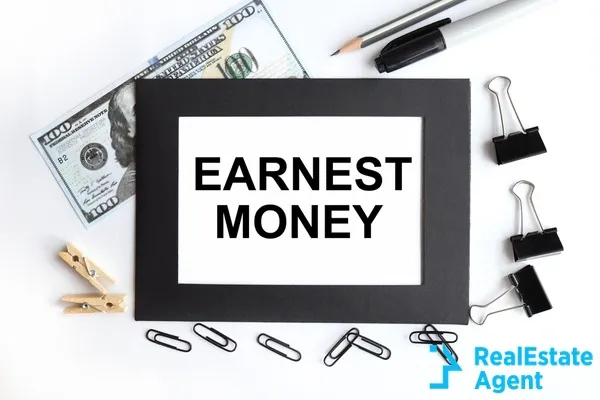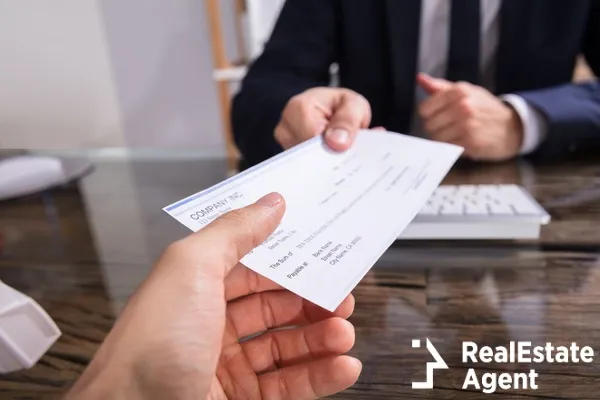 So, you are ready to take the big step of purchasing a new home. You've met the home seller, examined the property and neighborhood, and decided that you've found the one. You come to an agreement about the purchase price and are ready to go ahead and finalize your purchase. If you are applying for a mortgage loan, it can take 3-4 weeks for it to come through. How do you ensure that the home seller will hold the property for you until your financing comes through? On the seller's end, how do they know that you are serious about your offer and won't renege at the last minute? Here's where Earnest Money comes in.
So, you are ready to take the big step of purchasing a new home. You've met the home seller, examined the property and neighborhood, and decided that you've found the one. You come to an agreement about the purchase price and are ready to go ahead and finalize your purchase. If you are applying for a mortgage loan, it can take 3-4 weeks for it to come through. How do you ensure that the home seller will hold the property for you until your financing comes through? On the seller's end, how do they know that you are serious about your offer and won't renege at the last minute? Here's where Earnest Money comes in.
Understanding Earnest Money.
Earnest money is money that is put down towards the purchase price of a property to show your commitment to the deal. Often people call it good faith money or an escrow deposit, and it can be viewed as a safety net for the home seller. For example, when a buyer and seller enter into a purchase agreement, the home sellers have to remove the home from the market until the transaction is completed. However, if the deal falls through, the home seller has to relist the house all over again, resulting in significant financial losses.
In simple words, earnest money protects the seller if the home buyer backs out from the deal. The amount is covered by the home buyer and it is held in escrow until the deal is finalized, at which time it is normally credited toward the down payment or closing costs. The amount of money that would be required varies according to the real estate market and normally ranges from 1-5% of the purchase price. In competitive housing markets, the deposit can be much higher than that, but the cost can be negotiated between the buyer and the seller.
In situations where the home is being purchased with 100% financing, the money will often be returned to the home buyer to cover closing costs. In a seller's market, with many buyers competing for the same property, it can be helpful to offer a larger amount of earnest money to entice the home seller to accept the offer.
What happens to the money if the deal falls through?
 Buying and selling real estate is a vast and complex process; therefore, don’t hesitate to ask your agent all the important real estate questions before you buy a home. Now that you know what earnest money is, you probably wonder what happens with it if the deal falls through? There are multiple scenarios in which the money goes the seller’s way, or the earnest money is refunded to the buyer. First and foremost, as a home buyer, you should read your contract carefully; it stipulates who receives the money should the deal fall through.
Buying and selling real estate is a vast and complex process; therefore, don’t hesitate to ask your agent all the important real estate questions before you buy a home. Now that you know what earnest money is, you probably wonder what happens with it if the deal falls through? There are multiple scenarios in which the money goes the seller’s way, or the earnest money is refunded to the buyer. First and foremost, as a home buyer, you should read your contract carefully; it stipulates who receives the money should the deal fall through.
Laws vary from state to state, and many states allow a short amount of time for the home buyer to renege on the deal at no loss. After that point, in most cases, the money will go to the seller if the buyer backs out of the deal and vice versa. Upon cancellation, the sellers and buyers are asked to sign mutual release instructions. If an agreement cannot be reached, the party holding the earnest money deposit will continue to hold it until an agreement is reached.
When can the seller keep earnest money?
 Some homebuyers might not consider earnest money such a big deal since it eventually comes back in their possession, right? Not really! The seller gets to keep the earnest deposit in certain circumstances. For example, some first-time homebuyers with high expectations might find out a different reality and cancel the sale for no valid reason. In this situation, the seller gets to keep the money. The same applies if the home buyer doesn’t stick to an agreed timeline.
Some homebuyers might not consider earnest money such a big deal since it eventually comes back in their possession, right? Not really! The seller gets to keep the earnest deposit in certain circumstances. For example, some first-time homebuyers with high expectations might find out a different reality and cancel the sale for no valid reason. In this situation, the seller gets to keep the money. The same applies if the home buyer doesn’t stick to an agreed timeline.
Do not confuse earnest money with your down payment; it is a different cost that needs to be folded into the overall home purchase costs. Certain contingencies will help protect the home buyer from losing their money. If these contingencies aren’t stipulated in the contract, the money goes the seller’s way if the deal falls through. We will cover more about contingencies in the next section when we talk about how homebuyers can keep the earnest money.
You need to know that contingencies are there to help the home buyer get his/her earnest money back if he/she doesn’t get approved on a mortgage, the home doesn’t get appraised for the offered amount, or the house fails to pass inspection. If contingencies are not stipulated in the contract, and one of the mentioned scenarios happens to you, then you would not be able to back out of the deal without losing your earnest money to the seller.
Handing the earnest money to the seller is also one way you can lose it since the money should be administered by a trusted third party, and the funds should be held in escrow. Non Refundable earnest money is one of the riskier paths a home buyer can take since the seller gets to keep the earnest money if the deal falls through, despite the reason. It is not an uncommon practice in a seller’s market where homebuyers are competing for a property.
When can the buyer keep the earnest money?
Now that we covered most of the situations when home sellers keep the earnest money, we should also discuss how earnest money is refundable. In general, the buyer gets to keep the earnest money and direct it toward closing costs or downpayment at closing. If the deal goes through, the money is refunded to the buyer. But, if the deal doesn’t go through, the buyer keeps the earnest money if they are protected by contingencies stipulated in the contract.
Home inspection contingency - A common reason why home buyers may back away from a deal is that the house fails home inspection. After the home is inspected by a professional, some damages might arise, and some home elements might come back in need of repair. If the home buyer cannot agree upon a lower price or have the seller repair the damages, the buyer can back out of the deal and keep the earnest money if a home inspection contingency is in place.
Mortgage contingency - What if you weren’t preapproved for a mortgage when you put your earnest money in an escrow account, and it turns out that the lender will not finance you? Or what if you are preapproved on a mortgage by the time you place the earnest money, and later you are denied your mortgage? This is where financing or mortgage contingency comes into play to protect you and make sure your earnest money is refunded.
Appraisal contingency - It is not uncommon for properties to be overvalued. When a third-party appraiser from the lender determines the property’s fair market value, and it turns out to be lower, a few things can happen. As a home buyer, you don’t want to overpay for the house; therefore, you use this opportunity to negotiate a new price. If the seller refuses to approve the latest price, you can walk away from the deal with the earnest money in your pocket if you are protected by an appraisal contingency.
Make sure your money is held safely until the agreement is finalized:
There have been numerous instances where a real estate broker pretended to have the authority to execute an agreement on behalf of a seller and then disappeared with the Earnest Money. Therefore, it is essential to exercise caution and be sure your money is safe.
- Never give an earnest money deposit directly to the seller or principal broker.
- Make the deposit payable to a reputable third party such as a well-known real estate brokerage, legal firm, escrow company, or title company.
- Verify that the third party will deposit the funds into a separately maintained trust account.
- Obtain a receipt.
- It is not advisable to authorize a release of your earnest money until your transaction closes.
Buying your first home is an exciting milestone to reach. By carefully reading your contract, researching relevant laws, and exercising caution when handing over money, you can ensure that the deal proceeds smoothly.
Conclusion
For many homebuyers, earnest money might seem like another out-of-pocket expense that needs to be covered during the home buying process. However, you should not see it as a burden but rather a way to protect yourself and ensure that the home transaction goes through smoothly. As a buyer or seller’s real estate agent you don’t want your client to experience buyer’s remorse or to suffer financial losses because of undecided buyers.
With earnest money, homebuyers can protect themselves if something goes wrong with the property, and it can protect sellers from buyers that back out from the deal for no valid reason. At the same time, it is a way to assure home sellers that you’re serious about the offer.
If you find this blog’s content useful, don’t hesitate to share it on social media and let everyone know what earnest money is. Leave a comment down below and let us know how earnest money protected you during your home transaction.
















Have a question or comment?
We're here to help.